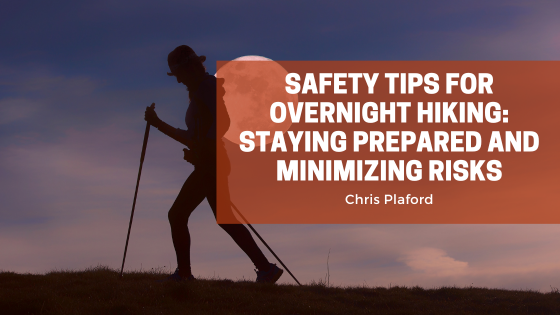Overnight hiking can be an exhilarating adventure, offering a chance to immerse oneself in nature and experience breathtaking views under the starry sky. However, venturing into the wilderness at night comes with its own set of challenges and potential risks. To ensure a safe and enjoyable experience, it is essential to be well-prepared and take appropriate precautions. Learn more about crucial safety tips for overnight hiking to help you stay prepared and minimize risks.
- Plan and Research Thoroughly: Start your journey by meticulously planning your overnight hike. Research the trail you intend to take, familiarize yourself with the terrain and weather conditions, and learn about any potential hazards along the way. Make sure to check the trail’s difficulty level and assess whether it matches your fitness and experience.
- Share Your Itinerary: Inform a reliable friend or family member about your hiking itinerary, including your starting point, route, expected return date, and emergency contact information. This way, someone will be aware of your whereabouts in case of an emergency.
- Pack the Essentials: Pack wisely and include all the necessary gear for overnight hiking. Essential items include a well-fitted backpack, a reliable tent, a warm sleeping bag, sufficient food and water, a first-aid kit, navigation tools, a flashlight, extra batteries, and appropriate clothing for changing weather conditions.
- Prioritize Safety Over Speed: While hiking at night, visibility is reduced, which may slow down your pace. Be cautious and take your time to avoid tripping hazards and potential injuries. Stay on marked trails and avoid shortcuts that could lead you astray.
- Light the Way: Carry multiple sources of light, such as a headlamp, flashlight, and extra batteries. These will prove invaluable in navigating the trail during the night, especially when setting up camp or answering nature’s call.
- Stay Hydrated and Nourished: Hiking requires physical exertion, and dehydration can be a significant risk. Drink plenty of water throughout the hike and bring enough snacks and meals to sustain your energy levels.
- Beware of Wildlife: Nocturnal animals are active at night, and you may encounter them during your hike. Keep a safe distance, avoid feeding them, and store your food securely to prevent attracting unwanted attention from wildlife.
- Be Weather-Ready: Weather conditions can change rapidly, especially in mountainous regions. Bring appropriate clothing and gear to protect yourself from rain, wind, or sudden temperature drops. Check the weather forecast before your hike and be prepared for any unexpected changes.
- Set Up Camp Wisely: When setting up camp, choose a location away from potential hazards like cliffs, falling branches, or flood-prone areas. Check for any signs of animal activity or nests nearby to avoid disturbing their natural habitats.
- Fire Safety: If you plan to have a campfire, be cautious and adhere to fire safety guidelines. Only build fires in designated areas, ensure the fire is completely extinguished before leaving, and never leave it unattended.
- Stay Calm in Emergencies: In the event of an emergency, stay calm and assess the situation. If you need help, use your emergency devices like a whistle, signal mirror, or phone to call for assistance.
Overnight hiking can be a transformative experience, but safety should always be your top priority. By staying prepared and taking precautions, you can enjoy the wonders of nature while minimizing risks and ensuring a memorable and safe adventure. Happy hiking!

